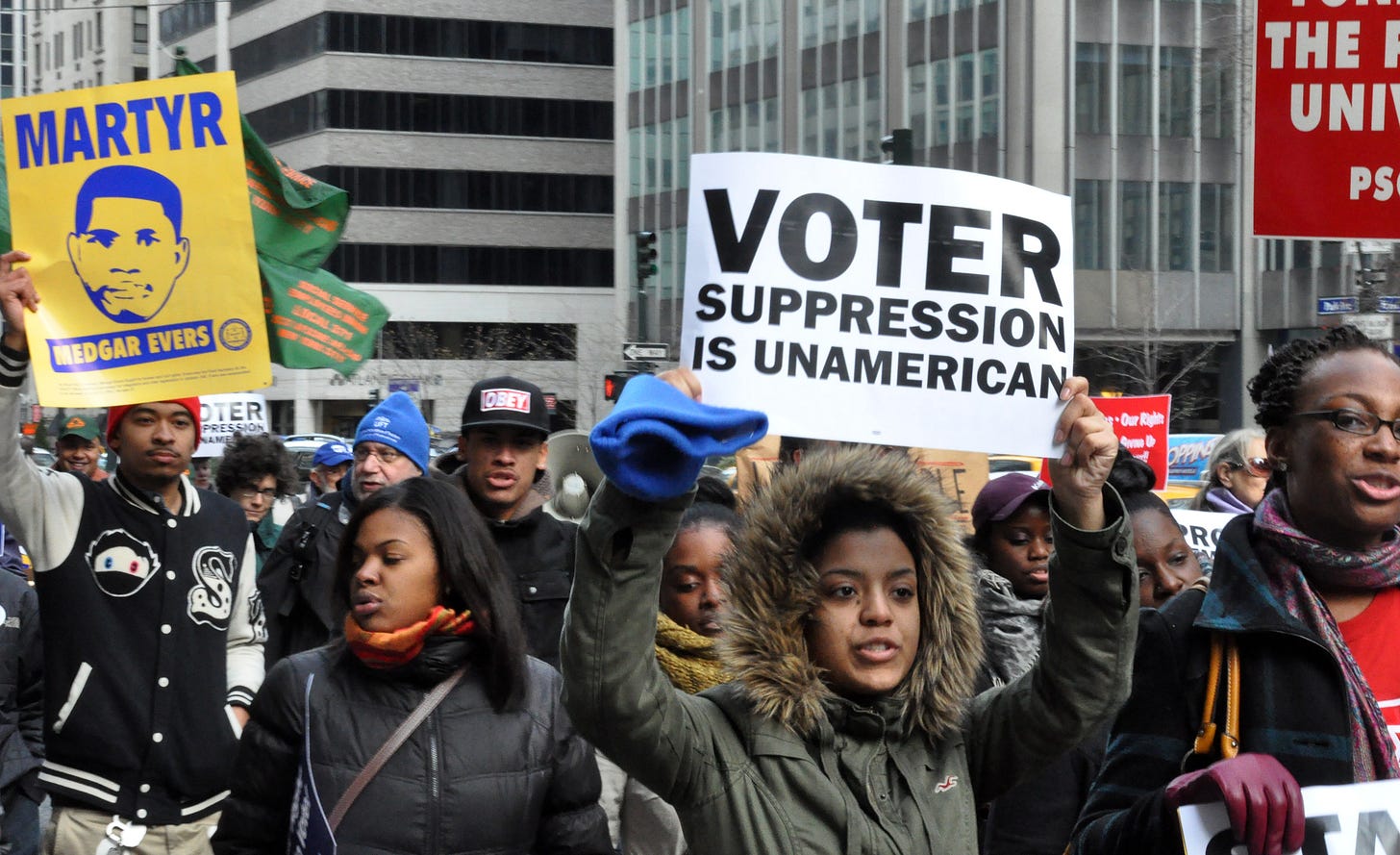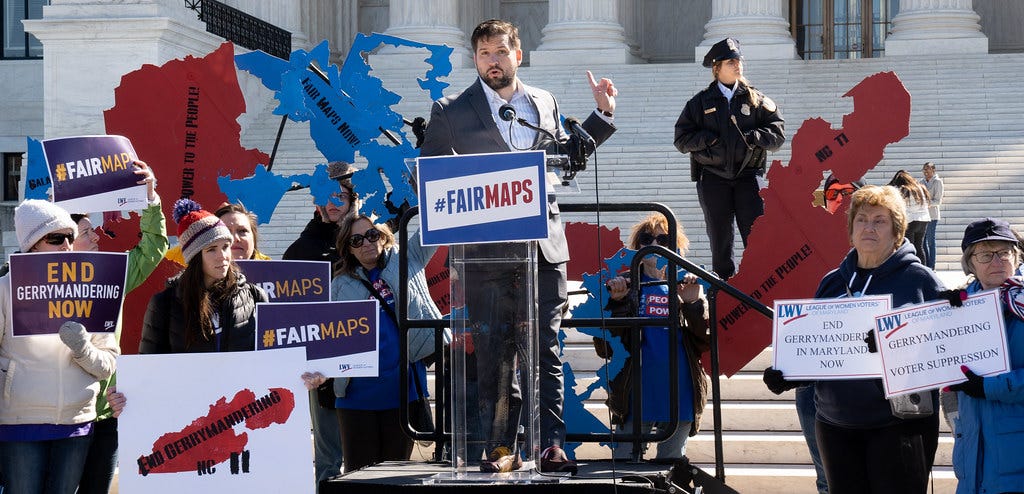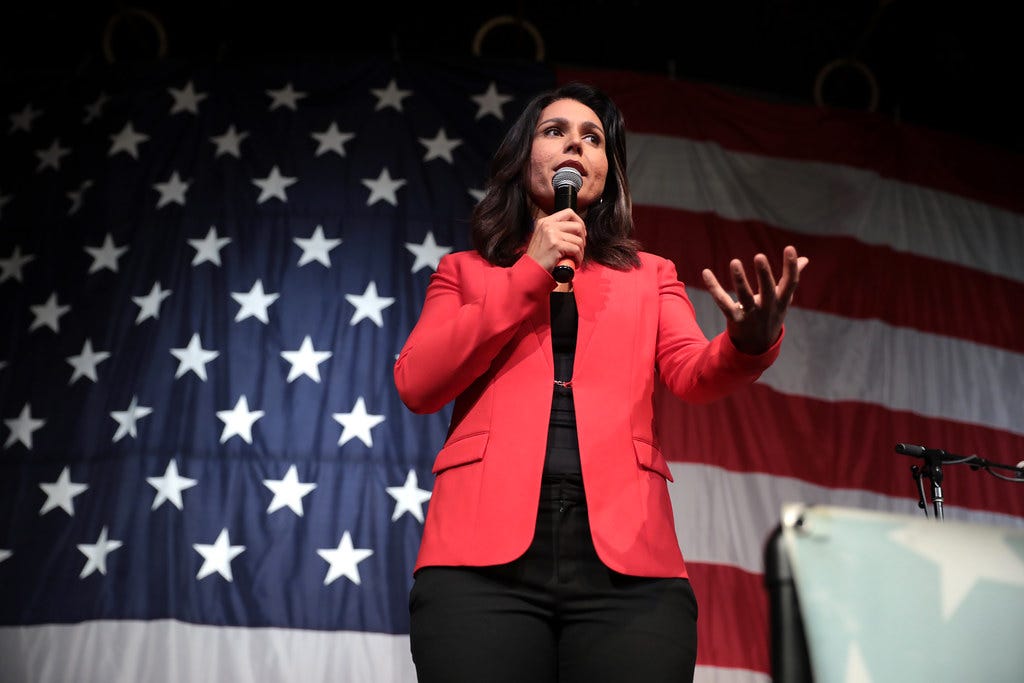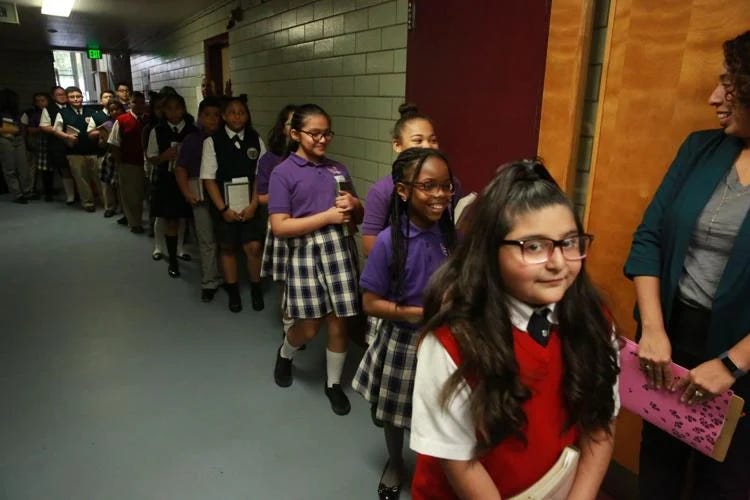Chicago Civic Update - Election Eve Edition
The Civic Update sounds the alarm about voting rights perils in Illinois, calls for an end to a rising tide of political violence, and shares our weekly list of stories you may have missed.
Voting Rights Under Threat In Chicago
By Pastor Chris Butler
When we Chicagoans think about the struggle to protect voting rights in 2022, our minds often go to our kindred in southern states like Georgia, Texas, and Florida. Our national news environment (and for some us, our on-the-ground connections) have kept us painfully aware of some of the egregious attempts within those borders to suppress the votes of poor and minority voters. We send prayers and aid, and some have even traveled and organized to protect that most fundamental right within a democracy, the right to vote. While I laud and have taken up my own share of that work, I think that it is important that we not forget about the voting rights issues that we have in our own backyard.
Let’s begin with something that should be nothing more than a short-term shock to the voting system in the city. After a drawn-out fight over electoral maps, the city of Chicago will have about 40 percent fewer polling locations in next week’s election. And a majority of Chicago voters will cast their ballots somewhere different than the place they voted in previous elections.
While these precinct changes are anticipated following each decennial census and the reapportionment that follows, the change normally takes place before the primary elections. This year, however, the reduction in polling places will mean that people will be voting in somewhere other than where they voted in the June primary election. There have been a lot of questions as to whether enough has been done to inform voters about these changes and to avoid chaos and confusion on Election Day.
But, some of the voting rights issues are less apparent and more long term. Perhaps the most important are the lack of electoral competitiveness and political maps drawn in such a way as to be resistant to community organizing.
First, let’s examine the issue of electoral competition. Most democracy advocates support the idea of competition as a net positive for voter power. Researchers at Harvard University show that competition matters in elections. The evidence suggests that uncontested and lightly contested elections tend to skew policy in favor of powerful special-interest groups at the expense of everyone else.
Chicago faces a very bleak outlook from that vantage point. Of the seven U.S. congresspersons to be elected next week to represent Chicago in Washington, only one will be the result of a competitive race. Five are not competitive and one is completely unopposed. Of 17 state senate races that impact a considerable portion of the city, only one is considered to be competitive on Tuesday and 11 are completely uncontested. That bodes well for the special interests, not so much for the rest of us.
The lack of competition in elections stems from another voting rights issue we’re facing in Chicago: the severe partisan gerrymandering of the state’s political maps. Every ten years, following the census, electoral district boundaries are redrawn with the goal of reapportioning the vote so that districts are relatively equal in voting population. In Illinois, the remapping process has been completely controlled by the Democratic Party, which has drawn maps to maximize Democrat-controlled districts. It is important to note that many more states in the nation are similarly controlled by their local Republicans and those states see maps gerrymandered in favor of that party.
But one of the unintended consequences of these maps is that many neighborhoods and municipalities are split between multiple representative districts. That makes it much more difficult to build effective neighborhood associations that hold elected officials accountable, since there are often too many “stakeholders” to demand true accountability. This problem impacts minority voters the most. That’s why the Chicago Lawyers Committee for Civil Rights and the state NAACP joined in a lawsuit against the maps that have been passed into law in the most recent redistricting.
With Election Day upon us, it is good and right that we continue to support our fellow Americans, our brothers and sisters in Christ who are facing clear and present threats to their fundamental voting rights (Shout out to all those who will be serving as poll chaplains in neighboring states with with Faiths United to Save Democracy). But we must resist the urge to hold our city in mind as a model for voting rights. From ranked choice voting, to redistricting reform, to finance reform, we have a long way to go. Let’s keep pressing toward that higher standard.
The Round Up
Here are the stories that caught our eyes this week and what they mean for the weeks ahead.
With one week left, Bailey, Pritzker hone in on suburbs — one with Tulsi Gabbard's help
Illinois’ Republican gubernatorial candidate Darren Bailey has pulled out all the stops as Election Day draws near, with a last-minute endorsement from former congresswoman Tulsi Gabbard, who campaigned with Bailey in person at a stop in Glen Ellyn.
Gabbard ran for president as a Democrat just two years ago. She recently left the party with an announcement on her new podcast, charging that the Democrats are “under the complete control of an elitist cabal of warmongers” who disdain religious Americans and stoke racial animosity.
Will Bailey’s gambit pay off with any independents or wavering Democrats? We’ll have to wait and see.
Garcia likely to run for Chicago mayor, Johnson throws his hat in the ring
We could have two new entrants into the already crowded Chicago mayoral race, as Cook County Commissioner Brandon Johnson officially enters the race and Congressman Chuy Garcia eyes doing the same.
Johnson has the backing of the Chicago Teachers Union and has made tackling crime and poverty the cornerstones of his campaign.
Garcia, who represents the 4th congressional district, put a poll in the field that shows he would easily defeat Mayor Lori Lightfoot in a runoff, and even best her in a head-to-head race.
We’ll be watching the mayoral contest closely and we’ll bring you additional coverage as the race heats up.
Englewood Residents Demand Affordable, Local Grocer Replace Closing Whole Foods Market
Residents in the Southside neighborhood Englewood are wrestling with how to provide access to high-quality grocery options as the short-lived tenure of Whole Foods in Englewood comes to end November 13.
Leaders suggest affordable local options would be better, but quality food and variety are also a must.
Local grocery chains have merged and some parts of Chicago could realistically be called “food deserts”.
In the coming weeks, we’ll keep an eye on what the big companies have on offer, highlight local success stories and do our best to make sure that you and your neighborhood have the best insights possible to make informed food choices.
As they say, if you don’t have a seat at the table, then you’re probably on the menu.
Illinois State Senate Candidate Kathleen Murray (R-21st District) Releases Parents Bill of Rights
Republican state senate candidate Kathleen Murray proposed legislation late last week that would require parental notification and consent prior to any non-emergency medical, physical or mental health treatment, exam or screening. This would presumably include abortion and gender-related medical procedures.
Among other provisions, the proposed bill would also greatly expand school choice, giving parents the right to direct their child’s taxpayer-funded education dollars to private schools. The legislation would also give parents the right to home school their children and require homeschooled students get equipment and supplies funded on an equal per capita basis with children attending schools outside the home.
Murray is running against incumbent Democrat Laura Ellman for state senate district 21, centered on Naperville. She has made the parental bill of rights a centerpiece of her campaign.
Newsclips
City Colleges reach deal with faculty, staff union to avert strike
Campaign Letter Not Meant To Mislead Voters: Hastings Rep
Pritzker’s ex-tollway chairman accused in lawsuit of trying to steer contracts, hire pals at agency
To end political violence, follow the example of its most unjust victim – Jesus Christ
By Mike Vick
In the final hours of Jesus’ life here on earth, religious authorities who had plotted almost from the outset of His three-year ministry to tamp down the growing influence He and His followers had in Israel finally set in motion a plot to use corrupt government officials and trumped up charges to arrest Him, try Him and ultimately execute Him.
As Roman soldiers converged on the Garden of Gethsemane and Judas betrayed Him with a kiss, one of Jesus’ most trusted disciples, Peter, pulled his sword and sliced off the ear of a soldier attempting to arrest his Lord and master.
Kneeling to heal the soldier’s wound miraculously, Jesus rebuked Peter, saying, “Put your sword back into its place. For all who live by the sword shall die by the sword. Are you not aware that I can call on My Father, and He will at once put at My disposal more than twelve legions of angels?” - Matthew 26:52-53
If ever someone had just cause to take up arms against a political enemy, was it not Jesus?
If ever someone had a good reason to speak harshly against false accusations, was it not the Righteous Judge of the world?
If ever a man had justification for hurling pointed invectives against the chorus of calumny arrayed against Him, surely it was the Son of Man.
Jesus faced an unjust arrest. At His sham trials before the Sanhedrin, Herod and Pilate, He stood mostly silent as His enemies hurled unjust accusations against Him. He submitted willingly unto death, even death on a cross.
As His life faded fast, among the last things He said on this side of His resurrection was, “Forgive them, Father, for they know not what they do.” - Luke 23:34
These words of Jesus should ring in the ears of everyone engaged in the rough and tumble of politics. You will face opposition. They’ll distort your position in bad faith. They may even outright lie about you. They’ll insult you, mock you, twist themselves into pretzels to make you seem like the devil incarnate.
They may even come against you violently. Many politicians from the local level up to the national have used inciting language that inspires others who are steeped in conspiratorial thinking to threaten physical attacks or even to act on those threats.
Illinois has not been immune to this scourge. A 21-year-old man stands accused of making violent death threats directed at Republican gubernatorial candidate Darren Bailey.
We’re all aware by now of the vicious Oct. 28 attack against Speaker of the House Nancy Pelosi’s husband Paul.
These attacks and threats come in the wake of one of the worst peacetime outbreaks of political violence this country has ever seen, the Jan. 6 attack on the U.S. Capitol, which took place after months of mistruths about an allegedly stolen presidential election coming from everyone from then-president Donald Trump down to local elected office holders.
Nearly two years later, that these unsubstantiated claims continue to be peddled on the midterm campaign trail by scores of elected officials, political pundits and candidates for office, invites further violence.
In the wake of the Dobbs decision, that the media and politicians on both sides have exploited the fears of people of genuine good faith who self-identify as pro-choice and pro-life instead of elevating voices calling for a better way forward, will lead to further misunderstanding, mutual animosity and hatred.
Terrorism experts say these incidents of violence are unfortunately predictable given our political rhetoric. They point to a concept called “stochastic terrorism”, which counter-radicalization researcher Kurt Braddock defines as “... a form of incitement, where the speaker uses coded language, dogwhistles, and other subtext to justify, promote, or advocate the use of violence without providing overt directives to do so.”
We would all do well, whether or not we are Christians, to handle political opposition like Jesus did.
If you’re a Christian, when you’re faced with a situation in which you could escalate a heated political exchange, check your ego at the door, take a step back in silent prayer, and open your Bible to the passages cited above.
Ask yourself if you were sharing your faith with a non-Christian rather than sharing your political beliefs with someone who disagrees with you if you would take the same tactic.
I encourage my fellow Christians, and indeed all Americans, to consider the words of Jesus. In this time of heightened tension, remember what He said in the Sermon on the Mount.
“Blessed are the peacemakers, for they will be called children of God. Blessed are those who are persecuted because of righteousness, for theirs is the kingdom of heaven.” - Matthew 5:9-10










